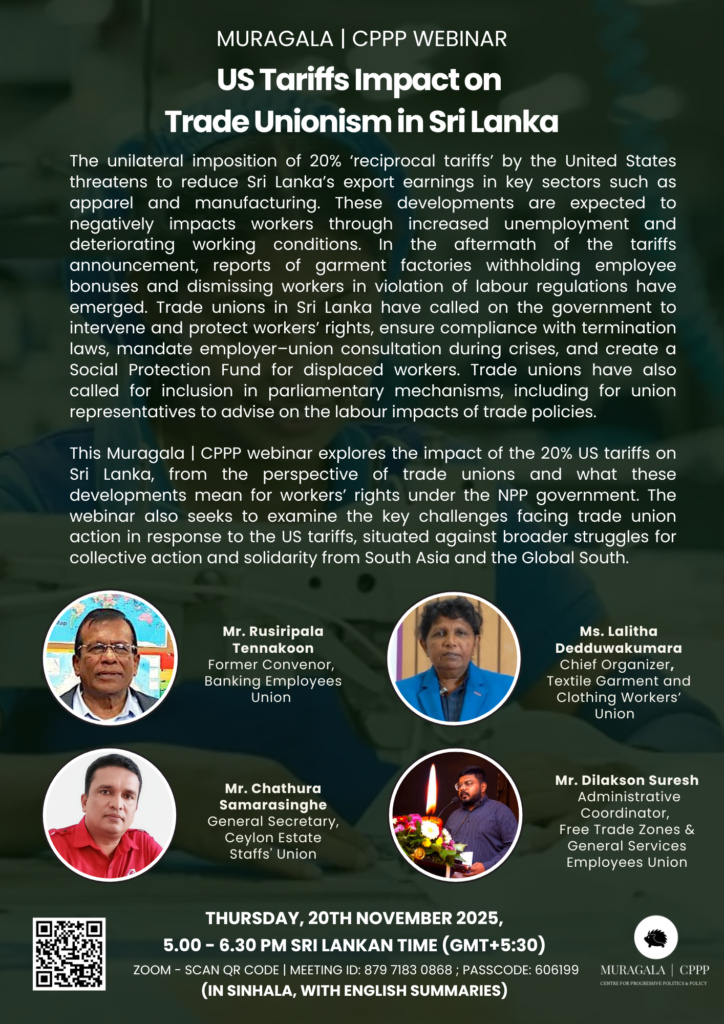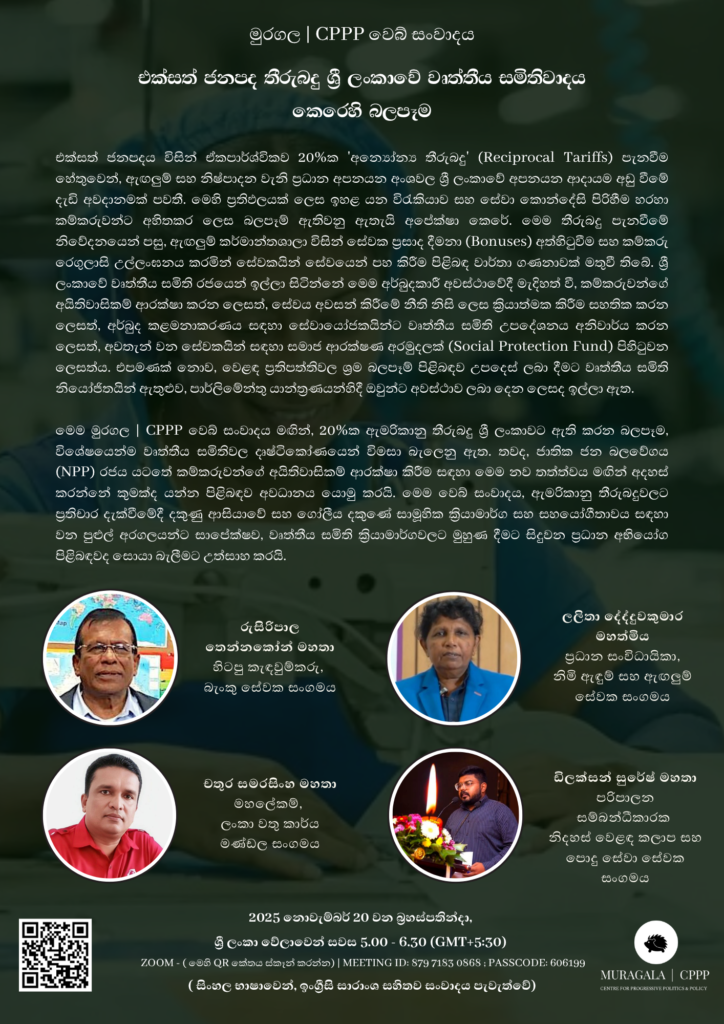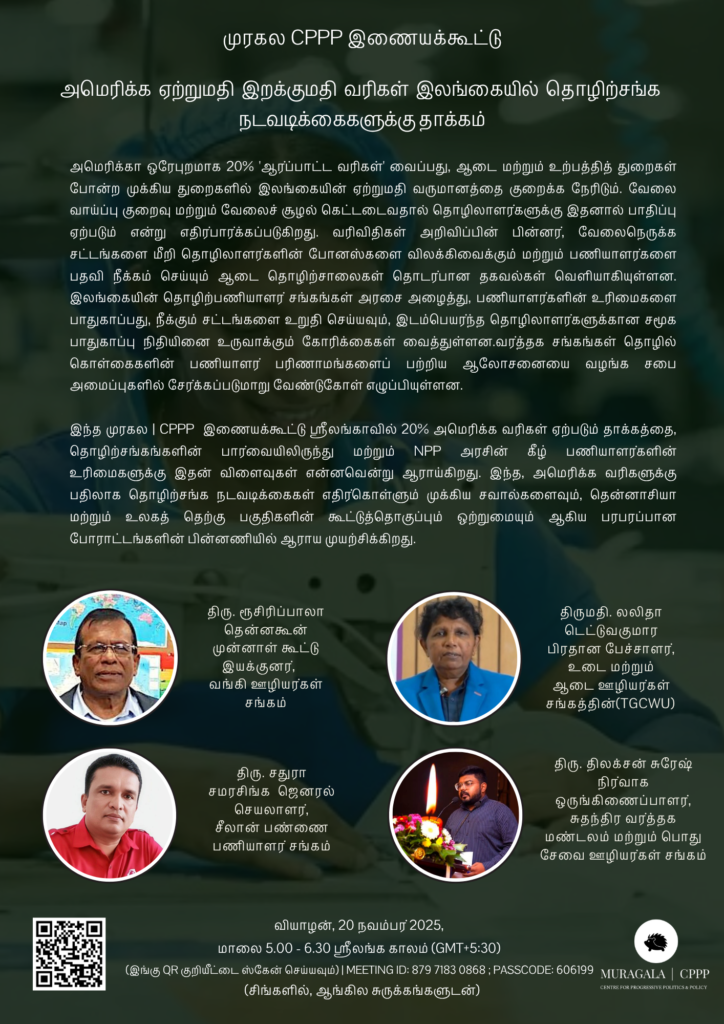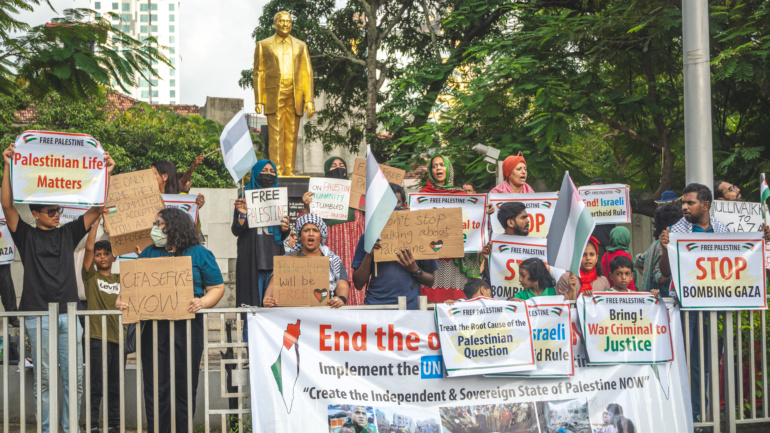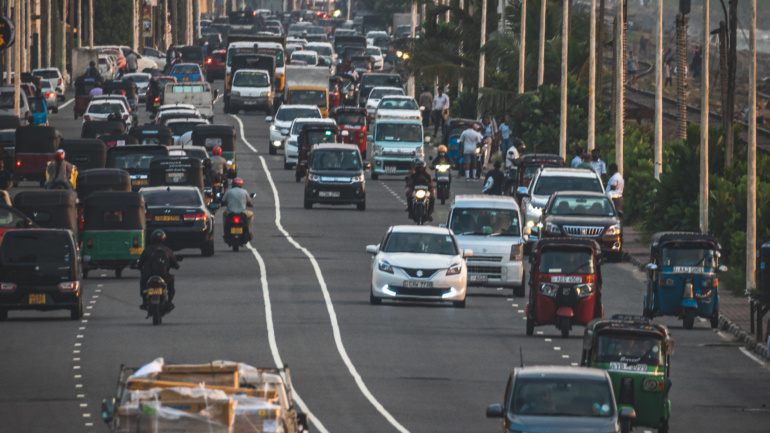About this Webinar
The unilateral imposition of 20% ‘reciprocal tariffs’ by the United States threatens to reduce Sri Lanka’s export earnings in key sectors such as apparel and manufacturing. These developments are expected to negatively impacts workers through increased unemployment and deteriorating working conditions. In the aftermath of the tariffs announcement, reports of garment factories withholding employee bonuses and dismissing workers in violation of labour regulations have emerged. Trade unions in Sri Lanka have called on the government to intervene and protect workers’ rights, ensure compliance with termination laws, mandate employer–union consultation during crises, and create a Social Protection Fund for displaced workers. Trade unions have also called for inclusion in parliamentary mechanisms, including for union representatives to advise on the labour impacts of trade policies.
This Muragala | CPPP webinar explores the impact of the 20% US tariffs on Sri Lanka, from the perspective of trade unions and what these developments mean for workers’ rights under the NPP government. The webinar also seeks to examine the key challenges facing trade union action in response to the US tariffs, situated against broader struggles for collective action and solidarity from South Asia and the Global South.
The full recording of the webinar can be accessed on Youtube at: https://www.youtube.com/watch?v=QNyHR9lyJqM
Speakers
- Mr Rusiripala Tennakoon – Former President, Ceylon Bank Employees Union
- Ms Lalitha Dedduwakumara – Chief Organizer, Textile Garment and Clothing Workers Union
- Mr Chathura Samarasinghe – General Secretary, Ceylon Estate Staffs’ Union
- Mr Dilakson Suresh – Administrative Coordinator, Free Trade Zones & General Services Employees Union
Moderator: Mr Harindra B Dassanayake (Muragala l Centre for Progressive Politics & Policy)
Date – Thursday 20th of November 5-6.30 pm SL time (with a Q and A session)
Zoom details – https://us06web.zoom.us/j/87971830868?pwd=CvSFKpDXrQ6K2akk7KxUj2wa9rnr3H.1 (Meeting ID: 879 7183 0868; Passcode: 606199)
Language – Sinhala (with English summaries)
Background
The unilateral imposition of 20% ‘reciprocal tariffs’ by the United States on Sri Lanka, revised downwards from the initially announced 44% in April, is effective from August 2025. US President Donald Trump has argued that imposing tariffs will increase US government tax revenues, encourage consumers to purchase more American-made products, and stimulate domestic investment in the US. The US has also been observed to use its new tariff policies as leverage to make broader economic and political demands on trading partners.
The National People’s Power (NPP) government has responded through trade negotiations with the US to reduce tariffs and explore a potential Free Trade Agreement. President Anura Kumara Dissanayake appointed a committee to study the tariff impact and dispatched delegations to Washington in April and May 2025 for discussions with US officials. The government also formed a working group to assess the effects on the apparel sector, with support from the Joint Apparel Association Forum (JAAF) and related industry bodies. The President also announced plans to introduce incentives to encourage export diversification and value-added production. During election campaigns last year, the National People’s Power pledged to focus on local industrial and manufacturing, including investing in R&D capacity. Major challenges remain in terms of logistics bottlenecks and structural barriers to trade and investment such as the existing tax regime and broader trade facilitation that hinder competitiveness.
The new US tariffs are expected to have a significant impact on the Sri Lankan economy, which is still recovering from the severe economic crisis of 2022 that led to a sovereign debt default and the declaration of national bankruptcy. Sri Lanka is currently implementing an International Monetary Fund (IMF) programme that requires substantial structural reforms and fiscal adjustments aimed at restoring macroeconomic stability. However, these measures are already straining the wellbeing and livelihoods of vulnerable sections of society, as poverty levels remain considerably high. According to the World Bank’s 2025 Development Update, Sri Lanka’s poverty rate is projected to decline slightly from 24.9 percent in 2024 to 22.4 percent in 2025 supported by modest economic growth, higher wages, and lower inflation. Nevertheless, food prices are expected to remain elevated, continuing to exert pressure on household budgets.
The unilateral US tariffs threaten to reduce export earnings, and increase unemployment in key sectors like apparel and manufacturing. The US is Sri Lanka’s largest single export destination, valued at approximately US$2.8 billion, especially for apparel, rubber-based products, coconut and agricultural goods. It is also Sri Lanka’s largest apparel export destination, contributing over 25% of total apparel exports. The apparel industry faces significant challenges going forward, such as order cancellations and declining profit margins. Industry leaders argue that these tariffs undermine Sri Lanka’s competitiveness in the U.S. market, where low-cost producers such as Vietnam, Bangladesh, and Cambodia have preferential trade access through bilateral or regional agreements.
In Sri Lanka, employees have also been pressing for labour law reforms, arguing that the country’s labour laws deter foreign investment and hamper economic competitiveness. Labour law reforms proposed in 2023 had sought to amalgamate 48 labour laws into a single framework. The current NPP government has announced that it is preparing to draft four new bills to replace existing legislation covering trade unions, labour relations, occupational safety, and termination of employment, following the review of 14 laws. These attempts at labour law reforms have raised raising concerns among workers’ groups that internationally-recognised labour standards would be eventually diluted. In contrast, in Bangladesh, the government recently ratified three major International Labour Organization (ILO) conventions in October 2025 on workplace safety and harassment, signalling a stronger commitment to enhancing worker protections and aligning labour legislation with international standards.
These developments are expected to negatively impacts workers through increased unemployment and deteriorating working conditions. The apparel industry in Sri Lanka employs a majority female workforce who are expected to be disproportionately affected by recent trade disruptions. Increased export costs following new US tariffs are expected to lead to factory downsizing, wage freezes, and reduced foreign investment. After the tariff announcement, a garment factory, Vogue Tex, declared in April 2025 that it could not pay New Year bonuses. In May, NEXT Manufacturing PLC in the Katunayake Free Trade Zone closed its only unionised factory in Sri Lanka, dismissing 1,416 workers via WhatsApp shortly after reporting over £1 billion in profit. The closure violated the Collective Bargaining Agreement with the Free Trade Zones and General Services Employees Union (FTZ & GSEU) and breached labour regulations, as the company failed to consult the union or obtain Labour Commissioner approval.
Trade unions in Sri Lanka have demanded government intervention to protect workers’ rights, ensure compliance with termination laws, mandate employer–union consultation during crises, and create a Social Protection Fund for displaced workers. They also called for inclusion in parliamentary mechanisms, of union representatives to advise on labour impacts of trade policies. Trade unionists have alerted that NEXT’s closure contravenes the Termination of Employment of Workmen (Special Provisions) Act No. 45 of 1971, which requires prior approval for large-scale layoffs.
On 13 September 2025, hundreds of Sri Lankan apparel workers took to the streets in Colombo to protest benefit cuts following the US’s imposition of a 20 per cent tariff on Sri Lankan exports. The Free Trade Zones & General Services Employees Union reported that Star Garments, which operates 11 factories in the Katunayake Free Trade Zone, has cancelled annual benefits such as uniforms, excursions, sports festivals, and year-end receptions. In response, unions joined with other social groups to form the “Social Movement for Alternative Solutions in the Face of the Global Tax Crisis.” Union leaders warn that the tariff will raise export costs, risk shrinking orders, and threaten up to 16,000 jobs in the apparel sector. While the government has argued that the tariff merely aligns Sri Lanka with competitors like Bangladesh and Vietnam, unions say employers are using it as a pretext to erode worker entitlements. The movement has requested a meeting with the President to discuss alternatives but has yet to receive a response, leaving workers questioning how the government will protect their rights.
This Muragala | CPPP webinar explores the impact of the 20% US tariffs on Sri Lanka, from the perspective of the trade unions. Among the questions it asks are:
- What have been the power relations among key domestic stakeholders related to the tariffs such as workers and trade unions, industry stakeholders, and political and policy actors, both local and foreign?
- What do these developments mean for workers’ rights under the NPP government?
- What are the key challenges facing trade unionism in response to the US tariffs, situated against broader struggles for collective action and solidarity from South Asia and the Global South?
Images copyright © T.K.G. Kapila
